- Home
- Bruce Sterling
Totem Poles
Totem Poles Read online
Begin Reading
Table of Contents
About the Authors
Copyright Page
Thank you for buying this
Tom Doherty Associates ebook.
To receive special offers, bonus content,
and info on new releases and other great reads,
sign up for our newsletters.
Or visit us online at
us.macmillan.com/newslettersignup
For email updates on Rudy Rucker, click here.
For email updates on Bruce Sterling, click here.
The author and publisher have provided this e-book to you without Digital Rights Management software (DRM) applied so that you can enjoy reading it on your personal devices. This e-book is for your personal use only. You may not print or post this e-book, or make this e-book publicly available in any way. You may not copy, reproduce, or upload this e-book, other than to read it on one of your personal devices.
Copyright infringement is against the law. If you believe the copy of this e-book you are reading infringes on the author’s copyright, please notify the publisher at: us.macmillanusa.com/piracy.
Dirt Complaining and Dirt Harkening were a long-buried married couple.
“I haven’t minded being dead one bit,” said Dirt Complaining. “But now we’ve got space aliens nosing around. And they’re curious about totem poles? Why did you men even make those things?”
“We were great artists,” said Dirt Harkening.
“Fools conjuring up cosmic forces.”
“I miss potlatch,” said Dirt Harkening. “That’s what I’ve missed most, down here in the Earth’s dirt.”
“Potlatch again,” said Dirt Complaining. “Ha! All you big chiefs, pretending to be above all wealth, so spiritual, so potent! Whose robes and amulets were you burning and throwing into the sea? Women’s crafts, women’s treasures!”
“Easy come, easy go,” said Dirt Harkening. “With flying saucers in the sky, our whole Earth is in play. But come what may, dear wife—our squabbles don’t matter anymore.”
“The heirs of our dead flesh still walk the Earth, husband.”
“The living take no account of us. People have forgotten that sacred truth was captured in the mighty symbolism of our totem poles. Even though the saucers understand.”
“Your totem poles were vulgar,” said Dirt Complaining. “Big phallic brags !”
“We artists like that sort of thing. A totem pole that stands up good and stiff—very fine.”
“Let’s see how this ends,” said Dirt Complaining.
* * *
Ida lowered her combat binoculars. She had pale skin, a heart-shaped face and a bob of lustrous dark hair. “It’s a shame that nobody sees the point of our struggle. What if we’re wrong?”
Kalinin adjusted his brimless fur Cossack hat. He was a bony, waxy-skinned warrior with high cheekbones and a great beak of a nose. “You and I will be heroes,” he said, looking tenderly upon Ida. “Once we learn how to kill this race of flying saucers.”
“But the saucers are saving the very Earth that mankind destroyed!”
“If you wash an apple before eating it, do you do that for the apple’s good?”
Heaped with garbage, a chain of filthy diesel trucks lumbered toward the vast scar of the coal mine, here in the Donbass region of the Ukraine. One after another, with distant groans and screeches, the great trucks dumped their trash. It was high noon, with a glaring sun.
The alien creatures had three primary forms—one for the air, one for the sea, and one fearsome form that infested the Earth itself.
The air invaders resembled classic flying saucers. They haunted Earth’s skylines, absorbing pollutants. In their seagoing form, the saucers took on shapes like whales. They devoured poison gyres of floating plastic with their ivory teeth, and filtered toxins with their dark baleen. And the subterranean saucers were colossal, rubbery, saucer worms. They infested mankind’s mines and landfills, erasing every scrap of poison they found.
Thanks to the aliens, the withered fields and rain forests, stricken by every form of human rapacity, were blooming again. Happy dolphins and gallant tuna swam the open seas. Wild pigs roamed the taiga like the wind. The planet’s molten poles were freezing again as the rising seas receded.
The very largest of the chthonic saucer worms was here in a Donbass coal mine. Kalinin’s sworn goal in life was to kill this worm. For weeks, militarized Russian diesel trucks had been dumping nuclear waste into the mine, filling it with choice bait for the saucers. Lured by this bonanza of filth, an armada of the flying saucers had burrowed into the shaft and had merged their bodies to form a vast and lumpy worm.
Sheltered by a rampart of wet sandbags, Kalanin and Ida watched one of the great, silvery saucers fly by overhead. Kalinin’s ragtag paramilitary warriors set up a rousing antiaircraft fire from their muddy ambush holes. But they weren’t firing bullets.
The living saucers, it seemed, had a weakness. They carried within them some prime directive about intelligent life, some ethic that manifested itself as a tenderness towards human beings. The saucers were unwilling or even unable to harm people. They had an especial loathing for dead people. Therefore Kalinin’s paramilitary troops fired human body-parts at any saucer within range—making the innocent blue sky above the radioactive coal-mine into an aerial graveyard of human carrion.
The saucer flexed, ducked, and dodged its way through the sprays of gore. The fierce militia-men concentrated their bloody fire the more. The saucer’s capacities, although great, were not infinite. Under the harassment of flying carnage, the saucer’s smooth seamless edges grew rough. The alien invader slowed, faltered, and broke into a hailstorm of twitching mirror-scraps. These were saucer grubs, actually quite good to eat.
The paramilitary troops howled with glee, and fired off celebratory blasts from their small arms. Their hot bullets would fall to earth somewhere, often killing civilians. No matter. Graveyards were a useful source for the body-parts. Flying saucers might spurn killing people, but no cosmic rule decreed that the Russians couldn’t kill themselves.
“Our best warriors are our dead,” remarked Ida, shaking her head.
“Only the dead stay true,” said Kalinin. His corps of armed volunteers was dwindling day by day. They shared Ida’s sense that the saucers were good. They feared the battle was unwinnable. And the local Ukrainian peasants were filling the warriors with wild tales. Supposedly a salamander-shaped saucer-being had resurrected a farm wife from her grave. The villagers were calling the old woman a saint.
“I do wonder why the saucers are so kind to us,” said Ida. “We’ve done nothing to deserve redemption.”
“They’re saving us up,” said Kalanin. “For a last supper.”
Silently Ida studied Kalanin, her expression a mixture of cunning and tenderness. A former painter turned Kremlin intriguer, Ida was Kalinin’s state-support liaison in his desperate, unauthorized war. She brought Kalinin black money, grim volunteers, experimental weapons, and deniable orders from the Kremlin.
Kalinin was a veteran of the Russian nuclear-missile corps. During his military career, he’d been at ease with the idea of human beings destroying the Earth. And he felt an instinctive hatred for the flying saucers and their campaign to heal the world. It was a horror to see beings who were immune to human malice.
When the saucers first invaded, Kalinin had been commanding a nuclear launch center. His hydrogen bombs had failed to impress the space invaders. The saucers merely shimmered and swayed through the thermonuclear shockwaves—insolent as striptease dancers. Russian military lasers did nothing to faze them. Particle beams, the same. Meanwhile the other nations were making peace with the aliens.
The Kremlin’s Higher Circles had
encouraged Kalanin to resign from the Russian army, and to strike out on his own. And now Ida was the only ally he trusted.
A talented portraitist, Ida had at one time enjoyed the intimate patronage of the Russian Minister of the Environment. But then the flying saucers had cruelly dissolved her oligarch’s pipelines and nuclear plants. The Minister had shot himself. Casting about for a new role, Ida had found her place as Kalinin’s liaison. But now she was ready to move on, and Kalanin knew it. She had a stash of jewelry to help her along. But what about Kalanin?
The nuclear-waste trucks retreated to fetch more garbage. The harsh sun beat upon the rutted earth.
“Let’s eat,” said Kalanin, and produced a loaf of tainted Chernobyl bread. He cut off a slice with his ever-ready bayonet.
Ida unsheathed a chunk of dried sausage. The meat within its casing was the flesh of a Przewalski horse. Methodically, the couple chewed their meager rations.
“That giant saucer worm likes you,” Ida told Kalanin. “You’ve fed it so much trash that it thinks you’re its best friend on Earth.”
“I’ve spoiled the worm, yes,” said Kalinin with a thin smile. “It’s like a decadent intellectual. A lazy gourmand that never spent a day on duty.”
“Don’t hate intellectuals, Kalinin. I’m one too. An artist, don’t you remember?”
Kalinin’s face reddened with a sudden access of rage. “Why do you ally yourself with decadent parasites? They only want to lord it over those who fight!”
“Are they so wrong?” said Ida gently. “Is war so wonderful?”
“We should liquidate any wretch who collaborates with the saucers,” cried Kalanin, maddened at the thought of Ida’s impending defection. Below his furry hat-brim, his narrow eyes filled with tears. Wildly he ranted. “Spineless bastards! Double-domes! Where’s their sense of destiny? Life to them is nothing but hashish and vulvas!”
“Let’s suppose the saucers are here to raise everyone’s level, dear Kalanin. Come with me now. Let’s see how our pet saucer worm has grown on its diet of poison rubbish.”
Kalinin and Ida made their way down from their overlook, following the debris-strewn tracks of the diesel trucks. The ragged lip of the former coal-mine was a variegated crust of crushed and flattened junkyard debris, smoldering like an overbaked pie. Moving with care, Ida and Kalinin tottered close to the unstable edge.
“What if a great hero chose this hole as his grave?” mused Ida. “A great man whom the worm loved. Such a hero might single-handedly transform the worm. Just as the mortar-blasted corpse debris transforms the flying saucers.” She gave Kalinin a calculating look. “How much do you love me?”
“What are you after?” said Kalanin, stepping back from the hole. The sun was beating on his head. The world seemed to spin around him. The rubble, the fruitless battles, Ida’s betrayal.
“It’s your best way out of here,” said Ida, nudging him forward once more. “Death in battle is a path to immortality. To resurrection, even. I’ll bring you back to life, and I’ll finally share your bed.”
They were at the very brink of the mineshaft, with the rubble shifting and rattling beneath their feet. Below them the gigantic worm stirred, liquid, exultant, entirely happy in its garbage.
Drunk with love, helplessly wanting to impress Ida, Kalinin leapt out into the air and slashed his own throat with his razor-sharp bayonet. He dropped down the shaft amid a spinning gush of blood.
Kalanin hit the bottom so fast that his substance merged into that of the startled saucer worm. And then—so great was the creature’s revulsion for human death—it explosively shattered into grubs. The sky-darkening plume of eruption was visible for hundreds of miles.
Ida was unharmed. Quickly and decisively, she took command of the paramilitary rabble—declaring a cease-fire and dismissing them all.
That night she set off for Mumbai, India. Following Kalinin’s plume.
* * *
“Mumbai is the greatest city mankind has ever seen,” Puneet remarked to his business associate, Leela. “We nearly wrecked the planet with filth, but that was just our subcontinental exuberance. And now, thanks to the saucers, all is well. Our business is an integral part of Mumbai’s greatness.”
Leela had brought in a bright stainless-steel tiffin-box full of free-range saucer grubs, fresh from the Ukraine. The edible grubs had blown in on the monsoon winds. They were unusually tasty. Leela offered one to Puneet, who gobbled it with his usual avidity.
Leela and Puneet were from the district of Maharashtra—elite school friends and now in business together. Their initial funding had come from Puneet’s prosperous family. Leela and Puneet had rocketed to commercial success by marketing saucer worms as a general house-cleaning product called Kleen Kobras.
The source of the worms? Lucky Puneet had managed to stable a saucer-creature inside a Mumbai warehouse, an anomalous silver being the size and shape of a crocodile. There was no knowing why the creature had approached him, but there it was. He fed it a steady diet of human garbage, and the obliging lizard budded off as many Kleen Kobras as Puneet and Leela could use.
It was Leela who’d thought of selling the worms. An image of the saucer salamander was an integral part of her marketing campaign—it appeared in all the ads. These days in India, there was a fad for all things relating to the beneficent saucers.
“Our trade is indeed bringing us fine success,” said Leela. “And now we should seek entree to high society. Philanthropy, Puneet. Highly upscale. We do something momentous for dear old Mumbai, and then we are in the social register.”
“A stupendous civic gift,” mused Puneet. “With the proviso that we spend no cash. Commercial moguls such as us are too slick for that.”
“Agreed,” said Leela. “What if you petition our saucer lizard on behalf of Mumbai? Perhaps a public feast upon our worms? Surely the lizard will honor the astral grandiosity of your soul.”
“You are a most agreeable woman,” said Puneet. He raised his finger. “I have indeed been envisioning a saucer gambit. A grand stroke for urban development. Presenting it as a philanthropy would be genial indeed.”
Leela crossed her stockinged legs and opened a paper notebook. “Tell me your raga to riches, Puneet.”
Puneet toyed with a cufflink, suddenly shy. But then, warmed by the sun of Leela’s smile, he found his voice. “I am proposing that we colonize Mumbai’s outlying districts with eleven duplicate copies of the city center.”
“What?”
“A Dodeca-Mumbai. Twelve supercities united in one magical, intricate graffito of urbanism. We’re far too crowded within our one small Mumbai. Once I issue my commands, we’ll enjoy a megasprawl of twelve. This is a good thing. The saucer lizard can accomplish it.”
“Truly so?” said Leela. “All I’ve seen the lizard do is hatch Kleen Kobra worms. Exceedingly many of them, yes, but—”
“Our saucer lizard is deeply sensitive to my kundalini,” replied Puneet. “The only limits are those within my mind!” Warming to the sound of his own voice, Puneet waved his spotless cotton sleeve at the view from their penthouse office’s window. “We’ll make the Dodeca-Mumbai of your dreams, Leela.”
“But I’ve dreamed no such thing.”
“The lizard and I will cut-and-paste our entire downtown, warping and squeezing where need be.”
“And you said—twelve in all?”
“I have conceptualized a keen workflow,” said Puneet, glowing with pride. “We copy Mumbai once, and that makes two Mumbais. Then we copy the two Mumbais, so there are four. And then—” Puneet rose from behind his teakwood desk and rapped his Kleen Kobra distribution map with a swagger-stick. “Then we make two fresh copies of the four, arriving at twelve altogether!”
“I understand,” said Leela, her expression studiously blank. She would never want the wealthy Puneet to know she thought he was an idiot.
“Imagine our tourism,” crowed Puneet. “Our exotic Indian fastness—twelve times as magical as before. Dodecadu
plicated by saucer aliens! What a place for a honeymoon.”
Leela tapped her front teeth with her mechanical pencil. “But—twelve Mumbais means twelve times the slums. Dodgy to promote.”
“We won’t be copying the people of Mumbai,” said Puneet. “Human reproduction is for the likes of you and I. The saucer lizard will only be replicating the infrastructure. Dodeca-Mumbai will have twelve classic Royal Taj Hotels. Twelve Bombay Stock Exchanges. Twelve Marine Drives. Each and every Mumbai dweller will have twelve times as much room!”
Leela made jotting gestures in her notebook. She gazed up at Puneet, widening her eyes. “Brilliance! The lowest slumdog sleeping on the pavement will prosper as a landlord. Imagine the looks on their faces in Dubai! The Arabs have a mile-high skyscraper, yes, but our metropolis will be twelve times so flat as ever before!”
“It’s good to have you as my business soulmate, Leela. Our brainpower is more than doubled. Dodeca-Leela-Puneet!” Puneet paused, studying Leela’s fair form. “May I venture another idea? What if we launch the first wave of Dodeca-Mumbai tourism with a fertility festival?”
Leela frowned. “Sex tourism?”
“Nothing so hole-and-corner as that,” said Puneet, adjusting his coiffure with his manicured fingertips. “In Dodeca-Mumbai we are looking for the stars.” His voice grew soft. “Listen to me, Leela. You and I might inaugurate the fertility festival, should you permit. We two have been selling saucer worms for months. Isn’t it time we discovered our mutual humanity? Carnal yet noble—like the conjugal sculptures of Khajuraho. Stirring the milk of life with the cosmic cobra.”
“This is a marriage proposal?”
“Who but Leela can be a worthy mate for the architect of Dodeca-Mumbai!”
“Very jolly,” said Leela.
Their nuptial ceremony was glamorous and elaborate. But in the midst of greeting the mass of wedding guests, and tying his robe together with Leela’s, and circling the sacred nuptial fire—all this while talking to the saucer salamander on his phone—well, Puneet made some slip-ups.

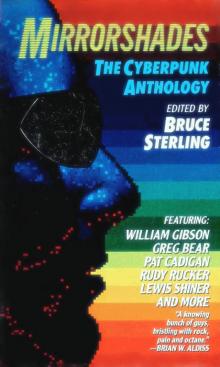 Mirrorshades: The Cyberpunk Anthology
Mirrorshades: The Cyberpunk Anthology The Wonderful Power of Storytelling
The Wonderful Power of Storytelling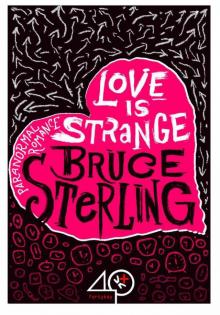 Love Is Strange (A Paranormal Romance)
Love Is Strange (A Paranormal Romance)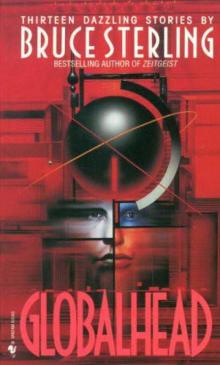 Globalhead
Globalhead Essays. FSF Columns
Essays. FSF Columns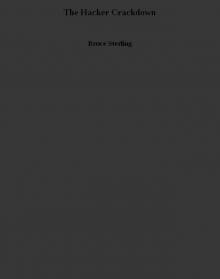 The Hacker Crackdown
The Hacker Crackdown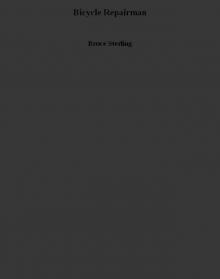 Bicycle Repairman
Bicycle Repairman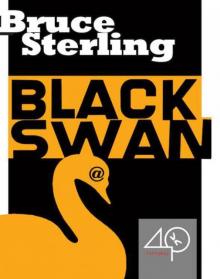 Black Swan
Black Swan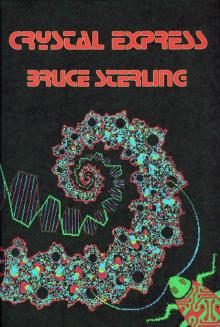 Crystal Express
Crystal Express Islands in the Net
Islands in the Net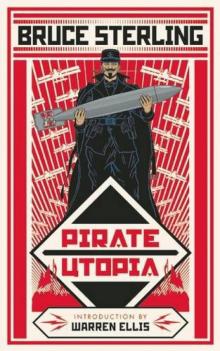 Pirate Utopia
Pirate Utopia GURPS' LABOUR LOST
GURPS' LABOUR LOST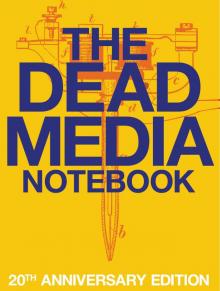 The Dead Media Notebook
The Dead Media Notebook Unstable Networks
Unstable Networks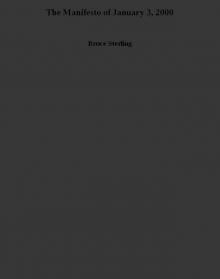 The Manifesto of January 3, 2000
The Manifesto of January 3, 2000 Heavy Weather
Heavy Weather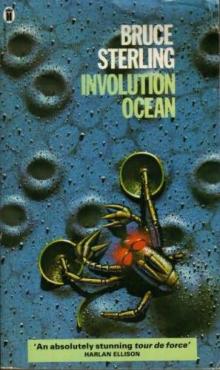 Involution Ocean
Involution Ocean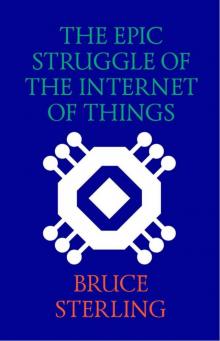 The Epic Struggle of the Internet of Things
The Epic Struggle of the Internet of Things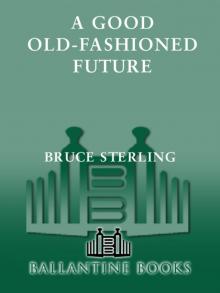 A Good Old-Fashioned Future
A Good Old-Fashioned Future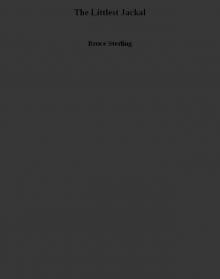 The Littlest Jackal
The Littlest Jackal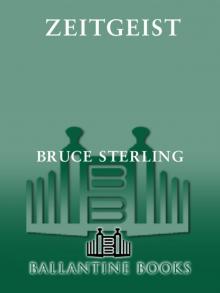 Zeitgeist
Zeitgeist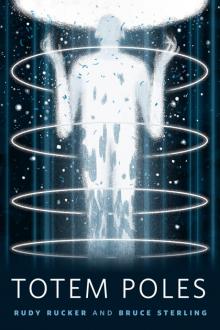 Totem Poles
Totem Poles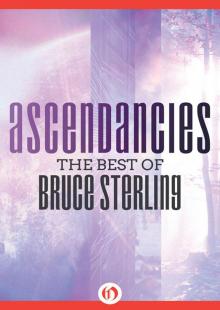 Ascendancies
Ascendancies CyberView 1991
CyberView 1991 War Is Virtual Hell
War Is Virtual Hell Taklamakan
Taklamakan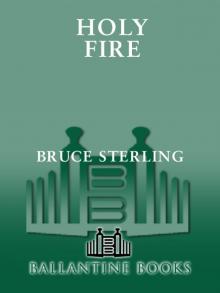 Holy Fire
Holy Fire Cyberpunk in the Nineties
Cyberpunk in the Nineties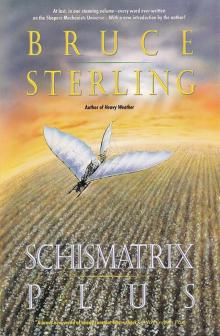 Schismatrix Plus
Schismatrix Plus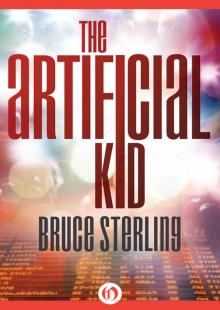 The Artificial Kid
The Artificial Kid Essays. Catscan Columns
Essays. Catscan Columns Maneki Neko
Maneki Neko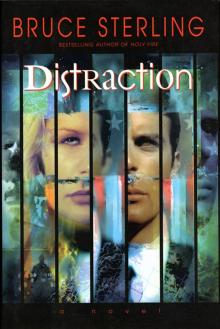 Distraction
Distraction In Paradise
In Paradise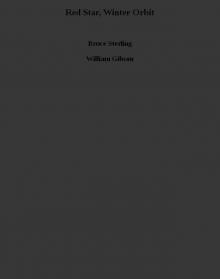 Red Star, Winter Orbit
Red Star, Winter Orbit Luciferase
Luciferase